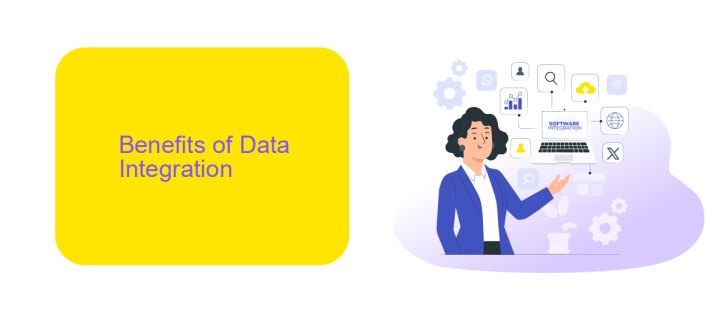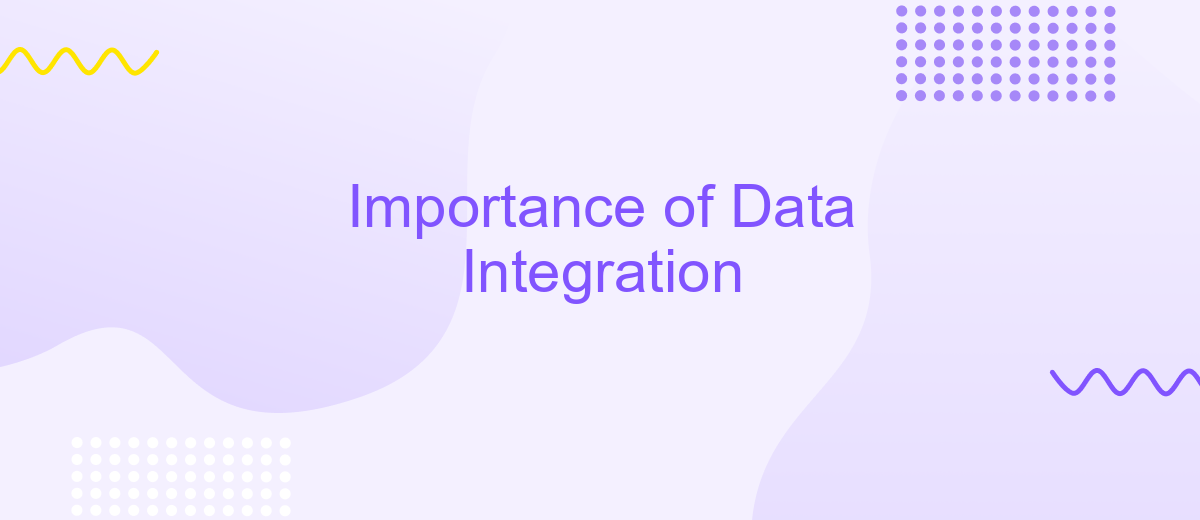Importance of Data Integration
In today's data-driven world, the importance of data integration cannot be overstated. It enables organizations to consolidate disparate data sources, providing a unified view that enhances decision-making, boosts operational efficiency, and drives innovation. By breaking down data silos, businesses can unlock valuable insights, streamline processes, and stay competitive in an increasingly complex digital landscape.
Introduction
In today's data-driven world, the integration of data from various sources is crucial for making informed business decisions. Data integration involves combining data from different systems to provide a unified view, which can significantly enhance an organization's ability to analyze and utilize information effectively.
- Improved data accuracy and consistency
- Enhanced decision-making capabilities
- Streamlined business processes
- Increased operational efficiency
Leveraging tools like ApiX-Drive can simplify the process of data integration, allowing businesses to connect multiple applications and automate data flows without the need for extensive technical expertise. By utilizing such services, organizations can ensure seamless data integration, leading to more reliable insights and better strategic outcomes.
Benefits of Data Integration

Data integration is essential for businesses aiming to streamline operations and enhance decision-making. By consolidating data from multiple sources into a unified view, organizations can eliminate data silos and ensure consistency across departments. This holistic approach not only improves data accuracy but also accelerates the process of data analysis, enabling quicker and more informed decisions. As a result, businesses can respond more swiftly to market changes and customer needs, gaining a competitive edge.
Moreover, the implementation of data integration solutions such as ApiX-Drive can significantly simplify this process. ApiX-Drive offers a user-friendly platform that seamlessly connects various applications and automates data workflows. This reduces the need for manual data entry and minimizes errors, allowing employees to focus on more strategic tasks. By leveraging tools like ApiX-Drive, organizations can enhance operational efficiency, reduce costs, and foster innovation through better data utilization.
Challenges of Data Integration

Data integration is a critical aspect for organizations aiming to leverage their data effectively. However, it comes with several challenges that can hinder seamless integration.
- Data Quality and Consistency: Ensuring that data from various sources is accurate and consistent can be a daunting task. Inconsistent data formats and duplicate records can lead to significant issues.
- Scalability: As organizations grow, the volume of data increases, making it challenging to maintain efficient data integration processes. Scalable solutions are necessary to handle large datasets.
- Security and Compliance: Protecting sensitive data and adhering to regulatory requirements is crucial. Data integration processes must ensure that data privacy and security standards are met.
- Complexity of Integration: Integrating data from disparate systems often requires complex transformations and mappings. This can be time-consuming and resource-intensive.
- Real-time Integration: Achieving real-time data integration is challenging due to the need for continuous data updates and synchronization across systems.
To address these challenges, organizations can leverage tools like ApiX-Drive, which offers a user-friendly platform for automating data integration processes. By simplifying the setup and management of integrations, ApiX-Drive helps organizations overcome the complexities associated with data integration, ensuring data quality, scalability, and security.
Modern Data Integration Techniques

Modern data integration techniques have evolved significantly, providing businesses with more efficient ways to manage and utilize their data. These techniques ensure seamless data flow across various platforms and systems, enhancing decision-making and operational efficiency.
One of the most popular methods is the use of integration platforms as a service (iPaaS). These platforms offer pre-built connectors and tools that simplify the integration process, reducing the need for extensive coding and manual intervention. Another emerging technique is the use of API-driven integrations, which allow disparate systems to communicate and share data in real-time.
- ETL (Extract, Transform, Load) processes
- Real-time data streaming
- API-driven integrations
- Integration platforms as a service (iPaaS)
Services like ApiX-Drive exemplify modern data integration tools by providing user-friendly interfaces and robust functionalities. ApiX-Drive enables businesses to connect various applications and automate data transfer without requiring deep technical expertise, making it an invaluable resource for modern enterprises aiming to streamline their data workflows.


Conclusion
In conclusion, the importance of data integration cannot be overstated in today's data-driven world. Effective data integration allows organizations to consolidate information from various sources, providing a unified view that enhances decision-making processes. By breaking down data silos, businesses can achieve greater operational efficiency, improve customer experiences, and drive innovation.
Moreover, leveraging tools like ApiX-Drive simplifies the integration process, enabling seamless connectivity between disparate systems without extensive coding knowledge. Such platforms facilitate real-time data synchronization, ensuring that all departments have access to up-to-date information. As businesses continue to evolve, investing in robust data integration solutions will be crucial for maintaining a competitive edge and fostering sustainable growth.
FAQ
What is data integration and why is it important?
How does data integration improve decision-making?
What are the challenges associated with data integration?
How can businesses automate data integration processes?
What are the benefits of using a data integration platform?
Apix-Drive will help optimize business processes, save you from a lot of routine tasks and unnecessary costs for automation, attracting additional specialists. Try setting up a free test connection with ApiX-Drive and see for yourself. Now you have to think about where to invest the freed time and money!

